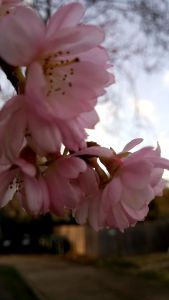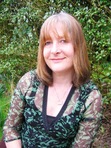Unseasonable
Christmas music, fairy lights and – cherry blossom?
In about twelve hours it will be the Winter Solstice: December here in the week before Christmas is all twinkly lights and seasonal music; completely unseasonal is the blossoming of this local ornamental cherry.

This tree, which stands alone, has always flowered much earlier than a line of other ornamental cherries round the corner, perhaps because, unlike them, it’s sheltered from the prevailing wind. Until now though, its pink blossom has always been a welcome sign of Springtime. I’ve never seen it in flower on the wrong side of Christmas – until today.
Here the weather has mostly been mild and wet, more like a soggy March or early April than December. We’ve had one brief spell of frosty nights and mornings, which lasted two or three days. Maybe the tree noticed that it’s been consistently mild after a period of cold and thought it was worth a chance. These observations of the first or the last of something in nature can be very useful in indicating how things have changed, and are changing still.
Every Sunday morning I listen to a radio programme from the Netherlands called Vroege Vogels /Early Birds’ (in my opinion, worth learning Dutch for). It starts at 7am Dutch time and 6am here. It’s all about nature (with interludes of classical music); one of the high points for me is the Fenolijn. Phenology is the recording and study of things happening in the natural world particularly in relation to the seasons. The Fenolijn features a selection of voices from among the many listeners to the programme, including children, who have called in and left a message that week, describing something they have observed. In Autumn there were quite a few reporting their astonishment at seeing their apple trees in bloom or that the local blue tits had risked bringing forth one more brood, or the presence of what must surely be the very, very last swallow.
Those chosen for broadcast are among hundreds of witness statements, which are hugely informative in helping to see trends and changes due to alterations in the climate or ecology of a place. There is much joy in experiencing nature, I think, but also warnings.
Phenology combines ecology and meteorology and those who have recorded their observations in the past are providing valuable insights today. This is one reason why I like to be accurate about these things in fiction. I don’t know if anyone else cares, but the weather in my novel The Chicken Soup Murder is the weather and the events are the events, in nature and in the news, because I kept a detailed record of what was going on and how it could affect my character’s story unfolding in a real place in real time.
But without having to be a novelist or a scientist, anyone can keep a record of things they observe and when and where. Post a photo on Instagram and you’re already recording something. But if you want to contribute to more directed study, then here in the UK you can also add a record of something you have noted in nature to the Woodland Trust’s Nature Calendar. The more observations the better, I think, to contribute to a realistic picture of how things are, whether things are happening earlier, later or quite out of season.
Will we have to change our ideas, when we have cherry blossom at Christmas instead of snow? In Dorset we often have mild wet winters, whereas for the Dutch it might be colder on the whole, with their edge of continent climate, but that doesn’t mean there will be endless stretches of frozen water to skate on in the Netherlands. You perhaps don’t know how many people there feel sore at heart because this might be yet another winter with no race on ice around the 11 towns – not if recent past winters are anything to go by.
Are you a phenologist? Have you noticed anything unseasonal where you live?
I am interested to know how all of these observations of the very local combine into a global picture. Any thoughts?
If you know of a means by which people can report their observations in your country, similar to the Fenolijn or the Woodland Trust page, please let us know in the comments. I’m interested!



